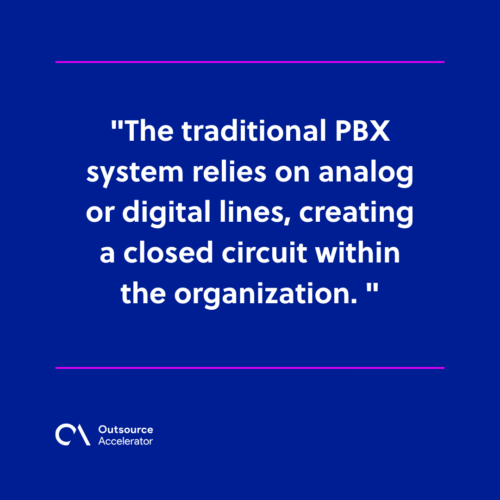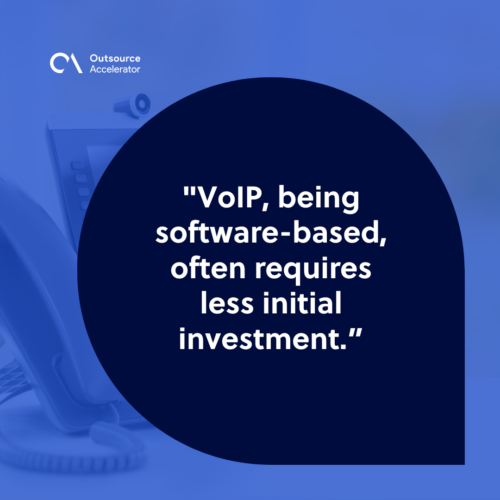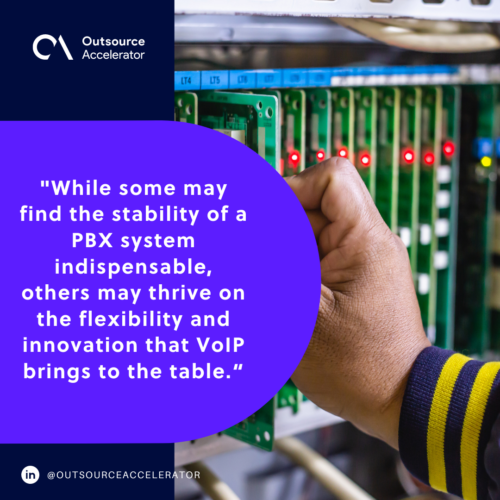PBX vs. VoIP: What’s the difference?

When it comes to business communication, the technology choices can seem overwhelming.
Two popular options that often come up in discussions are PBX and VoIP. But what exactly are these systems, and what sets them apart?
In this quick guide, we delve into the differences between PBX vs. VoIP, their advantages, disadvantages, and ultimately, which is better to use.
What is PBX?
Private Branch Exchange (PBX) has been a stalwart in the realm of business communication for decades.
PBX is a private telephone network used within an organization. It allows internal communication and provides a gateway to the external telephone network.
In simpler terms, it’s the technology that connects all the phones within an office.
The traditional PBX system relies on analog or digital lines, creating a closed circuit within the organization.
When a call is made from one internal extension to another, the PBX routes the call internally. However, for external calls, it connects to the Public Switched Telephone Network (PSTN) through dedicated lines.

What is VoIP?
On the flip side, Voice over Internet Protocol (VoIP) is the contemporary disruptor in the communication landscape.
Unlike PBX, VoIP leverages the internet to transmit voice data. Essentially, it converts audio signals into digital packets and transmits them over the internet to the recipient, where they are reconverted into audio.
VoIP eliminates the need for traditional phone lines and allows users to make calls using an internet connection. This technology has gained immense popularity due to its:
- Flexibility
- Cost-effectiveness
- Feature-rich capabilities
In fact, Research and Markets estimate that the global market for VoIP could be valued at US $913.2 billion by 2030.
PBX vs. VoIP: Key differences
Although the speed and quality of PBX vs. VoIP may be comparable, there are still numerous distinctions between them:
Scalability
One of the primary distinctions between PBX and VoIP lies in scalability.
PBX systems often require additional hardware for expansion, making scalability a potentially cumbersome and expensive process.
On the contrary, VoIP scales effortlessly with minimal infrastructure changes. Adding new users or features is as simple as a few clicks in the software interface.
Cost
Cost is a significant factor in any business decision, and here, VoIP takes the lead.
Traditional PBX systems entail higher upfront costs for hardware and installation. VoIP, being software-based, often requires less initial investment.
Additionally, long-distance and international calls with VoIP are usually more cost-effective, as they ride on the existing internet infrastructure.

Maintenance
When it comes to maintenance, VoIP again proves its efficiency. Traditional PBX systems demand regular physical upkeep and may experience downtime during maintenance.
VoIP, being software-driven, allows for remote troubleshooting and updates. This not only reduces downtime but also minimizes the need for on-site technical support.
Features
VoIP outshines PBX in terms of features. While PBX systems have evolved over the years, VoIP inherently offers a broader range of features, such as:
- Video conferencing
- Voicemail-to-email transcription
- Advanced call routing options
These features enhance overall communication efficiency, providing businesses with a competitive edge.
PBX vs. VoIP: Advantages and disadvantages
In the “fight” between PBX vs. VoIP, it looks like the latter is emerging as the winner. However, businesses should take note of each system’s strengths and drawbacks to see which one will suit them best:
PBX advantages
- Reliability. PBX systems are known for their reliability. As a mature technology, they have a proven track record of stability.
- Call quality. Traditional PBX systems often provide excellent call quality, especially in scenarios where internet connectivity may be unreliable.
- Security. Being closed and proprietary, PBX systems are perceived as more secure than VoIP, which relies on the open internet.
PBX disadvantages
- Costs. Higher upfront costs and potential ongoing maintenance expenses make PBX less budget-friendly.
- Scalability challenges. Expanding a PBX system may require significant investments in hardware and infrastructure.
VoIP advantages
- Cost-effectiveness. VoIP typically offers lower costs for both domestic and international calls.
- Scalability. This system has easy and cost-effective scalability, making it ideal for businesses with fluctuating communication needs.
- Feature-rich. VoIP is loaded with advanced features that can significantly enhance communication and collaboration.
VoIP disadvantages
- Dependence on the Internet. VoIP is susceptible to issues related to internet connectivity, potentially affecting call quality.
- Security concerns. The open nature of the internet introduces security challenges that need robust measures to mitigate.
PBX vs. VoIP: Which is better to use?
The choice between PBX vs. VoIP ultimately depends on the specific needs and circumstances of your business.
If you care about reliability, call quality, and security, and you can spend more money upfront, a PBX system could be what you need.
But if you’re more into saving money, growing easily, and having lots of features, VoIP is the way to go.
Consider the nature of your business, your team’s size, and your growth projections. While some may find the stability of a PBX system indispensable, others may thrive on the flexibility and innovation that VoIP brings to the table.

All in all, the PBX vs. VoIP debate is not a one-size-fits-all scenario. Both technologies have their strengths and weaknesses. It’s just about aligning the choice with your:
- Business goals
- Current needs
- Future aspirations
As technology continues to advance, staying informed will be key to making the right communication choices for your business.







 Independent
Independent




